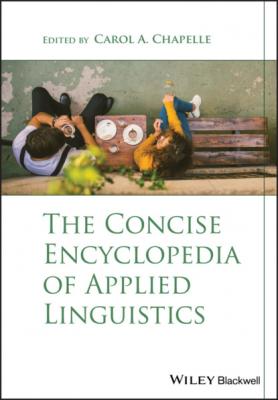The Concise Encyclopedia of Applied Linguistics. Carol A. Chapelle
Читать онлайн.| Название | The Concise Encyclopedia of Applied Linguistics |
|---|---|
| Автор произведения | Carol A. Chapelle |
| Жанр | Языкознание |
| Серия | |
| Издательство | Языкознание |
| Год выпуска | 0 |
| isbn | 9781119147374 |
Sometimes medially placed adverbs overlap between two not unrelated readings, here modality (emphasis) and manner: He was locked in concentration, unswervingly focused on his meditation; “He was steadily/totally focused and focused in a determined/fixed manner.” The intensive meaning predominates: It is intimated by the lexical verb locked and the accompanying manner adverbial in concentration and, as a result of “delexicalization,” the more lexically loaded, adverbial of manner reading becomes secondary. This remains true, no matter how lexically loaded the adverb(s) appear to be: It does not feel right to refer to her voice in the past tense, because it always sounds so fantastically, vitally [“absolutely,” “completely,” “totally”] in the moment (Hoye, 1997). Adverb classes are not watertight; their interpretation will depend on recognizing the wider context in which they occur, where there may well be a blending of possible interpretations.
Adverbs in Discourse
Adverbs are more than mere ornamentation; they underpin processes of textual argumentation and provide additional, circumstantial information that helps avoid any sense of anomaly or incompleteness about what is being said (Goldberg & Ackerman, 2001, p. 798). Pervasive in discourse, adverbs occur across all genres, regardless of levels of formality or medium. And regardless of their many detractors, such as those cited at the outset. Used judiciously, their role may be crucial. Ernest Hemingway, known for his terse prose, was not totally immune to their use, especially the ‐ly variety: “after forty days without a fish the boy's parents had told him that the old man was now definitely and finally ‘salao’, which is the worst form of unlucky” (Hemingway, 1952, p. 1). Here, the meaning of “salao” (Cuban and southern Spanish slang for “the worst kind of bad luck”) is captured and reinforced by the two adverbs, as they herald the gloss in the relative clause that follows, and somehow hint at the inward travails the old man has yet to face.
Crystal (2004, pp. 279–81, 291–3) identifies very broad correspondences between text types and adverb use in historical, geographical, scientific, and instructional writing, and in courtroom language, sports commentary, and public speaking. For instance, historical writing is characterized by the use of temporal and space (place) adverbs (events have a time and a place); instructions by process adverbs (how and with what is “x” to be done). In their extensive quantitative analysis of adverbial behavior, Biber et al. (1999) explore four registers: conversation, fiction, news, and academic writing. Hasselgård (2010, pp. 7–10, 259–85) additionally covers sports commentary and social letters. Both conclude that, overall, adverbs (adjuncts) are more common in commentary and fiction. However, generalizations are not easy. As Crystal (2004, p. 279) remarks: “[Adverbial] choice and distribution will be influenced primarily by the subject‐matter of the discourse.” Indeed, their recruitment may be compelling:
So terrified was he . . . of being caught, by chance, in a false statement, that as a small boy he acquired the habit of adding “perhaps” to everything he said. “Is that you, Harry?” Mama might call from the drawing‐room. “Yes, Mama—perhaps.” “Are you going upstairs?” “Yes, perhaps.” “Will you see if I've left my bag in the bedroom?” “Yes, Mama, perhaps—p'r'haps—paps!” [italics added] (Toulmin, 2003, p. 41)
SEE ALSO: Formulaic Language and Collocation; Pragmatic Markers
References
1 Aijmer, K. (2009). Does English have modal particles? In A. Renouf & A. Kehoe (Eds.), Corpus linguistics: Refinements and reassessments (Special issue). Language and Computers, 69, 111–30.
2 Biber, D., Johansson, S., Leech, G., Conrad, S., & Finegan, E. (1999). Longman grammar of spoken and written English. Harlow, England: Pearson.
3 Crystal, D. (1980). Neglected grammatical factors in conversational English. In S. Greenbaum, G. Leech, & J. Svartvik (Eds.), Studies in English linguistics for Randolph Quirk (pp. 153–66). London, England: Longman.
4 Crystal, D. (2004). Making sense of grammar. London, England: Longman.
5 Crystal, D. (2008). A dictionary of linguistics and phonetics (6th ed.). Malden, MA: Wiley‐Blackwell.
6 D'Agostino, R. (2009). The meaning of life: Wisdom, humor, and damn good advice from 64 extraordinary lives. London, England: Hearst UK.
7 Davies, M. (2004). BYU‐BNC: British National Corpus. Retrieved March 22, 2019 from https://corpus.byu.edu/bnc/
8 Davies, M. (2018). The 14 Billion Word iWeb Corpus. Retrieved March 22, 2019 from https://corpus.byu.edu/iWeb/
9 Furst, A. (2010). Spies of the Balkans. London, England: Weidenfeld & Nicolson.
10 Goldberg, A., & Ackerman, F. (2001). The pragmatics of obligatory adjuncts. Language, 77(4), 798–814.
11 Hasselgård, H. (2010). Adjunct adverbials in English. Cambridge, England: Cambridge University Press.
12 Hemingway, E. (1952). The old man and the sea. New York, NY: Charles Scribner's Sons.
13 Hori, M. (2002). Collocational patterns of ‐ly manner adverbs in Dickens. In T. Saito, J. Nakamura, & S. Yamazaki (Eds.), English corpus linguistics in Japan (Special issue). Language and Computers, 38, 148–63.
14 Hoye, L. (1997). Adverbs and modality in English. London, England: Longman.
15 Huddleston, R., & Pullum, G. (2002). Adjectives and adverbs. In R. Huddleston & G. Pullum (Eds.), The Cambridge grammar of the English language (pp. 525–95). Cambridge, England: Cambridge University Press.
16 James, H. (1920). The letters of Henry James selected and edited by Percy Lubbock (Vol. 2). New York, NY: Charles Scribner's Sons. Retrieved March 22, 2019 from http://www.gutenberg.org/files/38035/38035.txt
17 King, S. (2000). On writing: A memoir of the craft. London, England: Hodder & Stoughton.
18 Merriam‐Webster. (1994). Merriam‐Webster's dictionary of English usage. Springfield, MA: Merriam‐Webster.
19 Quirk,
